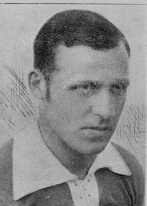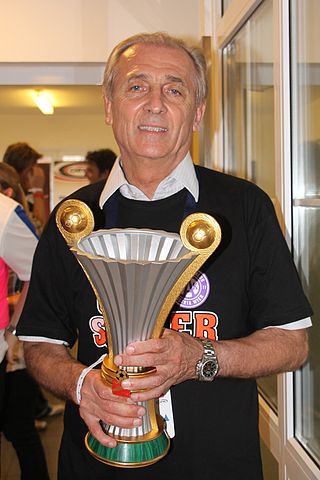Related Research Articles

Helmut Senekowitsch was an Austrian football player and later a football manager.

Alexander "Xandl" Popovic also known by different variations of his last name such as Popovich, Pops, Poppovich and Popovic I, was a professional football player and manager from Austria.
The 1938–39 Gauliga Ostmark was the inaugural season of the Gauliga Ostmark and organized by the National Socialist League of the Reich for Physical Exercise, the organizing body for sports in Nazi Germany. In March 1938, Nazi Germany annexed Austria in what is commonly referred to as the Anschluss, with the Gauliga Ostmark formed as a consequence. Austria and the Austrian football championship thereby ceased to exist until the end of the Second World War.
The 1939–40 Gauliga Ostmark was the second season of the Gauliga Ostmark, the first tier of football in German-annexed Austria from 1938 to 1945, officially referred to as Ostmark.
Karl Adamek was an Austrian football player and manager. A defender, he made eight appearances for the Austria national team.

Thomas Parits is a former international Austrian football player and manager.
Josef "Pepi" Stroh was an Austrian footballer and football manager. He played club football mainly with FK Austria Wien.

Burg Lichtenegg is a castle in Styria, Austria.
Franz Wagner was an Austrian footballer who played as a midfielder.
Johann "Hans" Erik Pesser was an Austrian football striker and coach.
Josef Pecanka was an Austrian field hockey player, footballer, and coach.
Erich Hof was an Austrian football player and coach who played as a forward.
Karl Schlechta was an Austrian football player and coach who played as a forward.
Gernot Fraydl is an Austrian retired football player and coach who played as a goalkeeper.
Leopold Nitsch was an Austrian football player and coach.
Walter Ludescher is an Austrian retired footballer and coach.
Karl Kowanz was an Austrian football player and coach. He played for Austria at the 1948 Summer Olympics. Karl Kowanz was the father of the internationally renowned artist Brigitte Kowanz.
Heinz Binder was an Austrian footballer who played as a defender. Binder died in Innsbruck on 28 April 2024, at the age of 81.
Leopold Gernhardt was an Austrian footballer and coach. He was also part of Austria's squad for the football tournament at the 1948 Summer Olympics, but he did not play in any matches.
Gustav "Guggi" Wieser was an Austrian football player and manager.
References
- ↑ "Team Stats". Austria Soccer. Retrieved 27 April 2012.